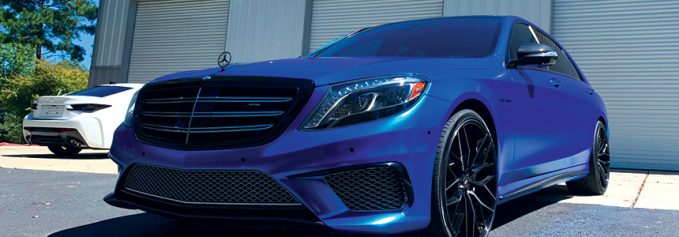
By Digital Output Staff
Printing is only half of the battle when it comes to wraps. It doesn’t matter how great the graphic looks if it can’t be installed properly. Honing your skills as an installer is beneficial, especially when presented with varied types of surfaces to wrap and materials used.
Miller Decals, LLC is a decal installation company based in Acworth, GA, co-owned by Jim and Starla Miller. In the late 1970s, enrolled in college for graphic design, Jim was presented with the opportunity to install graphics for a sandwich shop’s fleet of vehicles. It wasn’t his first foray into adhering graphics to vehicles, as Jim had been placing Little Debbie graphics on trucks for his dad and colleagues for years.
The job for the sandwich shop became the first endeavor under Miller Decals. Jim continued offering the service to large commercial fleets and the business’ customer base grew throughout the 1980s and 1990s.
Today, the company operates out of a 5,500 square foot headquarters with 18 employees serving the greater Atlanta metro area in addition to the Southeast U.S. At press time, it was in the process of building a new 13,500 square foot facility roughly a mile from its current building.
Above: Recent work completed by Miller Decals using wrap media from Avery Dennison.
Business Make Up
Miller Decals’ installations are categorized into five segments—commercial wraps, which take up 22 percent of the workload; flat surface installations at 23 percent; vehicle customization like color change, paint protection film, and ceramic coatings is 30 percent; recreational vehicle installs consists of 13 percent; and additional services such as site surveys and removals takes up roughly 12 percent of the business.
With such a variation in surfaces to be wrapped, the average time and how many people partake in an install differs from job to job. “We have an installation coordinator that works with the customers to determine the time it will take to complete their installation requests. Each one is unique to the scope of work. The number of installers is also determined by the scope of work,” explain the Millers.
A commercial wrap on a transit van usually takes a full day to clean, prepare, and adhere. “The ideal situation is that the vehicle should arrive in the afternoon/evening before the day of installation and the customer can pick up on the day after the installation. This gives us time to let it sit and then go over our work once again before the customer receives it,” they share.
Now a color change wrap or full paint protection job is usually on site for five to seven business days. Flat surface installation times are determined by the square or linear feet difficulty of the application and site location.
Trusted Tools
Another element that differs job to job—media. Since Miller Decals is strictly an installer, it doesn’t have much of a say in which printed materials are used. Its commercial customers provide printed materials for each install.
“These customers have formed relationships with their vendors and customers to develop branding that pertains to their specific needs,” say the Millers.
For vehicle customization, like color change films, Miller Decals offers a range of quality materials from vendors including 3M Commercial Solutions, Avery Dennison Graphics Solutions, Arlon, Inc., APA, General Formulations, Hexis, KPMF, and ORAFOL Americas. Most substrates used are cast films that conform well to complex curves. In addition, each individual media company offers a portfolio that is diverse in terms of both color selection and finish.
Having that variety in house is what differentiates Miller Decals from the competition. Its clients want options when it comes to material finish and color. “Most of these customers are looking to personalize their image or brand and want to pick out the one that speaks to their individuality. That is why it is important to be able to develop multiple skill sets that allow you to install many different vinyl materials,” share the Millers.
Part of a successful wrap installation involves using the best tools for the job. For Miller Decals, necessary physical tools include a knife, squeegee, or a glove and heat. The most important tool though, knowledge of the craft, according the Millers. “To be a successful wrapper you must constantly and consistently hone your skill.”
That means pursuing education on how to properly clean and prepare a wrap for installation, understanding stretch and pressure, researching materials and tools that work for you, teaching yourself how to read a layout and tack it up on a vehicle with magnets, and learning about safety tips and tricks.
Commitment to Install
What started as a job for a sandwich shop in the 1970s has blossomed into a soon-to-be 13,500 square foot facility catering to a long line of valued customers. Miller Decals focuses on wrap installations and its commitment to this part of the process shows in its work.
With a versatile assortment of substrates used in house, the vehicle wrap installer is able to offer its customers options. This is ideal for the type of clientele Miller Decals regularly interacts with, as many are looking to personalize their vehicles.
Oct2022, Digital Output


